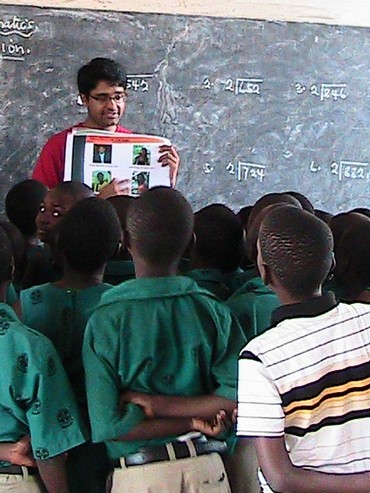Arthur J Pais
The Indian American and Princeton graduate turned down Rhodes and Marshall scholarships will now be studying Economic Policy Evaluation and Planning at the National University of Ireland, Galway
Mohit Agrawal, a mathematics major at Princeton, isn't surprised when people ask him why he declined to go to the Rhodes Scholarship interview and chose the Mitchell Scholarship instead
"Of course, Rhodes is known worldwide and you get to study at Oxford," said Agrawal, who was the only student last year to be a finalist for the Rhodes and Marshall Scholarships. "But Mitchell, I believe, will give an opportunity to work closely with other scholars -- we are only 12, unlike Rhodes which has 32 each year."
Mitchell Scholars get nearly double of what Rhodes Scholars get. Boarding, travel and tuition are worth $60,000 per person for the scholarships named after the former United States Senator George J Mitchell and his role in the Northern Ireland peace process. The Scholarships recognise outstanding American students 'who exhibit the highest standards of academic excellence, leadership and community service.'
Agrawal was selected from 262 applications from 163 colleges and universities nationwide. Endorsing his bid for Mitchell, Stephen Morris, the Alexander Stewart 1886 Professor of Economics at Princeton, wrote: 'Mohit is a sophisticated mathematical thinker with a deep interest in public policy With his combination of talent and social commitment, he will do great things, and the Mitchell Scholarship will be a great first step for him.'
Community service has been ingrained in Agrawal from his school days in Indiana where his father Suresh Chand who was born near Fatehpur Sikri, Uttar Pradesh is a professor at Purdue University.
"I learned the importance of education first-hand from my father who was one of seven children," he said. "His parents could not read or write but they insisted my father and his siblings had proper education. When I see what my father and his siblings have accomplished despite coming from a poor family, I am motivated not only to excel but to give back."
'Can't think of a better time or place to study economics and policy'
Image: Mohit Agrawal, Hank Song, Daniel Condronimpuno, Jane Yang, and Candice Tsay at an EWB meetingAfter receiving one of Princeton's Martin Dale Summer Fellowships in 2009, Agarwal spent a summer in Ghana establishing a youth newspaper with senior secondary school students from Ashaiman, a shantytown near the capital Accra.
"People live in overcrowded homes in this large urban slum," he said. "There is very little scope for good education."
He and a fellow Princeton student who are members of Engineers Without Borders supervised the building of a library in the compound of a private school. At least 60 people can sit in the library, which has 5,000 books collected from a book donation drive at Princeton. It was not an easy task, said Agrawal, who was the EWB project manager in Ghana in 2009.
There was a "wary reception from the Ghana Education Service," he recalled. "We got back on track only after we undertook a veritable political campaign we assiduously met with local parents and politicians, allayed their fears, and welcomed their feedback." Only then, a local elected official came forward to help and get the permissions to start the project.
One of the most honored of Princeton students, Agarwal has won Princeton's Shapiro Prize for Academic Excellence for his freshman and sophomore years, and the university's George B Wood Legacy Sophomore Prize, presented annually to a member of the junior class in recognition of exceptional academic achievement during the sophomore year.
He was also chosen to be a member of USA Today's All-USA College Academic Second Team. He will pursue a master's degree in Economic Policy Evaluation and Planning at the National University of Ireland, Galway. His professional goal is to formulate economic policy at the World Bank, the United Nations Development Program, or the Treasury.
Ireland, which had enjoyed a buoyant economy for over 15 years, was hit by an economic collapse months ago.
"I can't think of a better time or place than 'now' and 'Ireland' to study economics and policy," Agarwal said. "The Irish government is -- out of necessity -- fulfilling every economist's dream by experimenting with housing policy, tax policy, and deficit spending. Being able to understand how the Irish claw back from the precipice of economic crisis will help inform my perspective as a want-to-be economic policy maker."
Economic policy baby steps
Image: A sign hangs on the railings of the Bank of Ireland, in central DublinPhotographs: Cathal McNaughton/Reuters
Excerpted from Mohit Agrawal's Mitchell Scholarship essay
Earlier this semester, Professor Joshua Bolten -- budget director and chief of staff under former President George W Bush -- opened our weekly policy seminar by picking up an oversised OMB calculator. 'Mohit, you're the only math student in here, right?'
My first instinct was to respond with a light joke, but all that came to mind was, 'Yes, sir, I'm prime.' Fearing the reproach of my 15 classmates and friends, I refrained from employing the corny rejoinder. But the alternative -- a straight answer -- was impossible. Professor Bolten's question presupposed a binarism between 'math' and 'non-math' students, but I can't categorise myself in that way. Yes, I am a math major, and if that makes me a de jure "math" student so be it. Yet the de facto truth is much more complex (though not imaginary).
I responded to Professor Bolten's question with the simple, 'I suppose so, sir.'
With disparate interests in politics, policy, mathematics, and development, I straddle that frontier between 'math' and 'non-math.' I grew up in a politically aware, if not politically active, household: breakfast with The Wall Street Journal, carpools with NPR, dinner with Dan Rather, and political banter in-between. I have come to identify strongly with the Democratic Party, and though I don't agree with all of the party's policies, my disagreements including my skepticism of teachers' unions, Social Security, agricultural subsidies, and Israeli policy won't get me run out of the Democrats' big tent.
.Back in class, Professor Bolten responded to my answer: 'I ask because you seem so normal.' The class laughed, and I broke into a grateful smile. Professor Bolten then handed over the calculator; I froze in anticipation would this be my first opportunity to compute and analyze the cost of some economic policy?
Yes, but only baby steps. 'Subtract outlays from revenues. What is the federal deficit this year?'




Comment
article